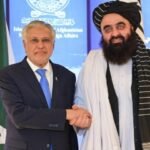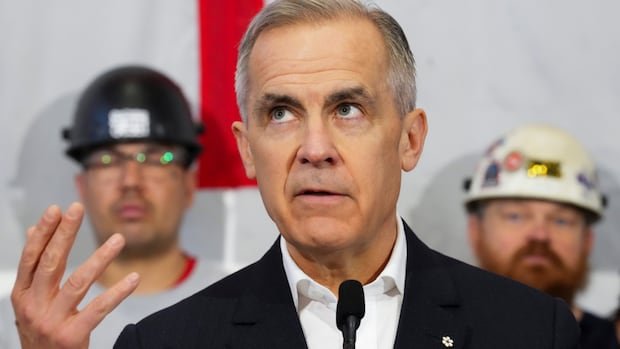An investment fund of $ 5 billion created under the leadership of Mark Carney in Brookfield Asset Management was recorded in the Tax Refuge of the Cayman Islands, according to the records obtained by Radio-Canada.
That adds to two other funds for a total of $ 25 billion that were registered in Bermudas, another fiscal refuge on the high seas, when the liberal leader was on the board of directors of the signing from 2020 to 2025.
In all three cases, the structures are legal, respect international fiscal regulations and are commonly used by investment companies. They also ensure that Canadian investors pay taxes on the profits of their investments in Canada, and not in foreign countries.
Brookfield declined to comment on its use of tax havens as part of the structuring of their funds. In previous public statements, the company has insisted that it does not participate in tax evasion, and that all its entities pay all the taxes required in the jurisdictions in which they operate.
The Liberal Party directed questions to Brookfield.
“Mr. Carney worked for Brookfield from August 2020 to January 2025 and has no participation in the company,” said Liberal spokesman Mohammad Hussain.
Other political parties have said that the use of tax havens by the company raises questions about Carney’s activities in the private sector and their possible management of tax problems if the liberal party wins the elections of April 28.
The conservatives also criticize the fact that Carney did not make public which assets put in a blind confidence when he became a liberal leader and prime minister last month, including those he would have acquired during his time in Brookfield.
Earlier this week, the conservative leader Pierre Poilievre minimized the Carney time value in the corporate world, claiming that his liberal counterpart benefited from his political connections to increase his personal equity.
“You need to immediately release your personal financial participations so that Canadians can judge for themselves,” said conservative deputy Michael Barrett in a statement.
A matter of ‘efficiency’
In response to multiple questions from the media during the campaign, the liberal leader has said that the decision to register two Brookfield funds in Bermudas was a matter of “efficiency”, not tax evasion.
“The flow through the funds goes to the Canadian entities that then pay the taxes properly, instead of the taxes that are paid several times before arriving there. This is how we have this structure. That is the structure that all our pension funds follow,” said Carney on March 26.
The two Brookfield funds recorded in Bermudas are the Brookfield Global Transition Fund ($ 15 billion) and the Brookfield Global Transition Fund II ($ 10 billion), launched in 2021 and 2024 respectively.
The third fund registered in the Cayman Islands is called the Catalytic Transition Fund. Launched in 2024, aims to invest $ 5 billion in the “Energy and Clean Transition” field. Unlike two other funds, the catalytic transition fund aims to specifically invest in projects located in emerging markets.
The initial fund inverter was Alterra, financed by the United Arab Emirates and announced as the largest private climate investment fund. He Caisse de dépôt et placement du québec He also finally invested in the background, among others.
‘It means you are earning money’
Tax expert Jean-Pierre Vidal, professor of accounting sciences in Hacreal, says that the use of tax havens is still little known to many citizens, especially because their use has been severely restricted in recent years.
“With regard to Canada, tax havens are used to reduce taxes paid in foreign countries,” said Vidal, explaining that they help companies pay more taxes in their country of origin when their investments are repatriated.
Even so, he said that jurisdictions with low or minimum levels of corporate taxes help reduce costs for companies such as Brookfield.
“Canada was not a loser, in fact, he was a winner, but it is certain that these companies earned more money because they were in these places. This is what we want to say efficiently … It means that you are earning money.”
The European Union publishes a list of “non -cooperative” jurisdictions for fiscal purposes, but neither Bermuda nor the Cayman Islands have been in it since 2019.
According to the PWC accounting firm, there is no corporate tax in the Cayman Islands, while Bermudas introduced a 15 percent corporate tax rate this year, with a series of exemptions for some corporate entities. Brookfield funds recorded in Bermudas are private and their exact tax status is unknown.

Political opponents will point
The conservative party has continued to increase the possible conflicts of interests derived from the time of Carney in Brookfield, which is particularly active in the field of renewable energies and green technologies.
The conservatives also criticize the fact that Carney did not reveal the assets that he put in a blind confidence when he became a liberal leader and prime minister last month, including those that he would have acquired during his time in Brookfield from 2020 to 2025.
Earlier this week, the conservative leader Pierre Poilievre minimized the Carney time value in the private sector, claiming that his liberal counterpart benefited from his political connections to increase his personal equity.
Carney has said that he created his blind trust in collaboration with the Ethics Commissioner, and that conflict screens exist to avoid any discussion that affects Brookfield.
Last week, the NDP leader promised to end the fiscal agreements between Canada and jurisdictions such as Bermuda.
“We lose tens of billions of dollars each year due to tax havens, due to large companies that avoid countries their fair part,” said Jagmeet Singh.
Bloc Québécois leader, Yves-François Blanchet, asked the liberal leader to “reveal his foreign assets.”
“Mr. Carney thinks that taxes are simply for normal people, and not for millionaires or billionaires like him,” said the block leader.







